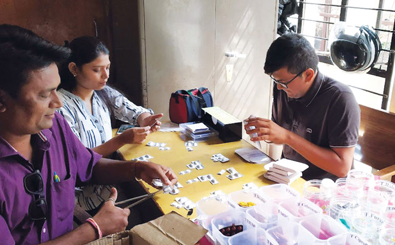Product design, Internet of Things and cellular technology coming together to improve adherence to TB medication regimes, and enabling remote patient monitoring
Problem
The side effects of TB medication often lead to a lack of treatment adherence by patients. Patients do not always complete a prescribed course of treatment, leading to the emergence of drug-resistant forms of TB and disease recurrence by 6 fold. Ensuring proper adherence to medication can significantly reduce these risks, and this practice currently depends on healthcare workers following up manually with patients.



Solution
TMEAD (Tuberculosis Monitoring Encouragement Adherence Drive) is a device to help improve patients’ adherence to their prescribed TB treatment regimen. The device is pre-filled with medicines as prescribed for the patient, which are also pre-sorted by dose. The device uses Internet of Things & cellular network technologies to monitor adherence to medication by patients and provides physical alarms and digital notifications as reminders to patients to take their medication. It also notifies health workers of adherence to treatment by patients using IoT and cellular technologies, overall improving tracking and monitoring of patients.
IMPACT
- The device has been used by more than 800 patients undergoing treatment for drug-sensitive and drug resistant TB till date in Maharashtra & Gujarat.
- TMEAD’s health technology assessment was completed by IIPHG, Gandhinagar, showing high levels of treatment adherence in the TMEAD intervention group (99%) as compared to the control group (90%).
- The health technology assessment of TMEAD by Dept. of Health Research (DHR) revealed that treatment adherence is high with TMEAD compared to standard therapy of care for DS-TB patients and the intervention is cost-effective. The results have led to the device being recommended to the Central TB Division (CTD) for use in the NTEP. Based on DHR’s presentation to CTD, TMEAD will be required to be integrated in the Nikshay platform, which will allow reporting of patient treatment adherence on the platform and supplement TB case notification and monitoring efforts. Based on these positive outcomes, TMEAD is currently being recommended by CTD to the state.
“TB requires a prolonged medication where the number of medicines are way too much for patients. The device acts like a digital nurse that reminds patients to take their medication and manages their daily dose. It also helps the healthcare workers support these patients better. IHF is the perfect platform to help early innovators (like us) in achieving their goals.”



